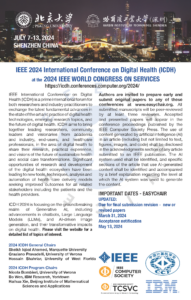ICDH 2024 Theme: Embracing Generative AI in Digital Health: Innovations, Challenges, and Ethical Implications
Call for Papers
IEEE International Conference on Digital Health (ICDH) is a prime international forum for both researchers and industry practitioners to exchange the latest fundamental advances in the state of the art and practice of digital health technologies, emerging research topics, and the future of digital health. ICDH aims to bring together leading researchers, community leaders and visionaries from academia and industry, end-users, and healthcare professionals, in the area of digital health to share their research, practical experience, and visions of the future of sustainable health and social care transformations. Significant opportunities of research and development of the digital health ecosystem have been leading to new tools, techniques, analysis and automation of health care delivery models seeking improved outcomes for all related stakeholders including the patients and the health providers.
ICDH 2024 is focusing on the groundbreaking realm of Generative AI, including advancements in chatbots, Large Language Models (LLMs), and AI-driven image generation, and their transformative impacts on digital health.
We invite researchers, industry practitioners, healthcare professionals, and innovators to contribute their latest findings, experiences, and visions in this dynamic field. The conference aims to foster a comprehensive understanding of how generative AI technologies are reshaping healthcare delivery, patient engagement, medical training, and health data management. We also delve into the latest developments in the Internet of Medical Things (IoMT), patient digital twins, and robotics, reflecting the diverse technologies shaping the future of healthcare.
ICDH will include a broad range of issues and concerns, including, but not limited to, the following topics:
- Generative AI in Healthcare: Exploration of chatbots, LLMs, and AI-driven image generation in healthcare applications.
- AI-Driven Patient Care and Engagement: Utilization of AI in personalized patient care, telemedicine, and patient education.
- IoMT and Digital Twins: Innovations in the Internet of Medical Things and the creation and application of digital twins for personalized patient care.
- Robotics in Medicine: The role of robotics in surgical procedures, rehabilitation, diagnostics, and patient care.
- Information and Communication Technology Medical Education: Exploring significant experiences and curricula from med-tech schools that combine AI, robotics, wearable sensors, and diagnostic devices in training future medical professionals.
- Innovative Models and Architectures: Advancements in digital health and integrated healthcare services with a focus on AI applications.
- Disease-Specific AI Interventions: AI applications in managing chronic conditions and personalized medicine.
- User-Centered Design: Solutions focusing on user needs, including for older adults, individuals with special needs, and emergency scenarios.
- Digital Health for Inclusive Care: Strategies to reduce disparities and increase accessibility in healthcare, particularly for under-served communities.
- Digital Health in Emergency and ICU Settings: AI applications in critical care environments.
- Health Economics and Community Engagement: Studies on the economic impact and community involvement in AI-driven healthcare systems.
- Ethical, Privacy, Security, Regulation and Policy: Addressing the ethical implications, data privacy, and security challenges associated with AI in healthcare. Discussions on the evolving regulatory landscape impacting AI in healthcare.






